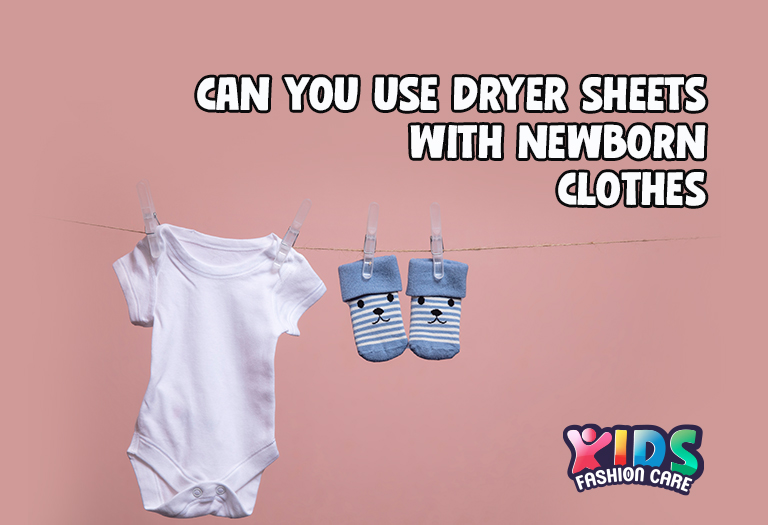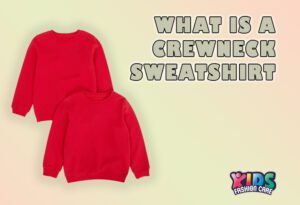Skip the dryer sheets for newborn clothes! Their chemicals and residue can irritate the baby’s delicate skin—stick to natural softness instead.
Many new parents wonder, can you use dryer sheets with newborn clothes? Don’t Worry Moms, let’s talk dryer sheets—those little laundry helpers with a big reputation for adding softness and a fresh scent to clothes. Though, they’re not appropriate for newborns. Dryer sheets often have chemicals and fragrances that can irritate your baby’s ultra-sensitive skin.
Dryer sheets are designed to reduce static and make fabrics feel softer. But they also leave a residue on fabrics. Thus, these residues can end up on your baby’s clothes, blankets, and even their tiny socks. It can clog up the natural fibers in cotton. These clogs make clothes less breathable. Babies need all the airflow they can get to stay cool, dry, and comfy.
The safer route? Skip the sheets and embrace air-dried or tumble-dried clothes, which are naturally soft enough for newborns. If you really want that extra softness, try using a baby-safe detergent or add a cup of white vinegar to the rinse cycle. It’s gentler, just as effective, and your baby’s skin will thank you!
Table of Contents
When caring for your newborn, every detail matters. Newborns have delicate, sensitive skin that needs the gentlest care — including the clothes they wear. We use dryer sheets usually to soften fabrics and reduce static. They also add a nice scent to laundry, but are they safe for your baby’s clothes? Some friends of mine who are new parents also asked me the same question. So, I thought why not write an entire guide on it.
What are dryer sheets? Why may they not be the best choice for newborns? In this guide you’ll get answers regarding dryer sheets. I’ll also discuss some safe alternatives that keep baby clothes soft and static-free. I hope this guide will help you out next time you wash your baby’s clothes.
What Are Dryer Sheets?
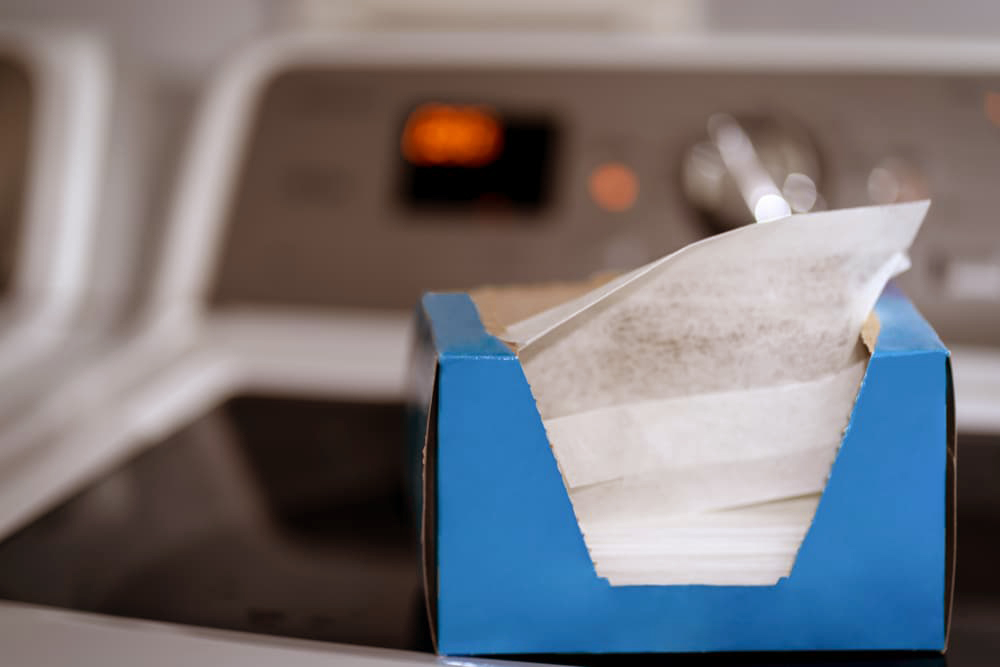
Photo Credit: All Star Cleaning Services
Dryer sheets are small sheets. They are made with fabric softeners, static-reducing agents, and fragrances. While washing clothes you’ll toss them into the dryer with laundry. As the dryer heats up, these ingredients spread over your clothes to soften the fabric. It reduces static cling and minimizes wrinkles, and adds fragrance. All of these sound great, right? Dryer sheets are great for a regular load of laundry but baby clothes need a little extra consideration.
Benefits of Using Dryer Sheets:
- Dryer sheets soften fabric. They add a smooth and soft texture to clothes.
- They reduce static and keep clothes from clinging to each other.
- They also add fragrance and leave a pleasant scent behind.
- Dryer sheets minimize wrinkles. These sheets help clothes come out looking smooth and neat.
Why Dryer Sheets May Not Be Ideal for Newborn Clothes
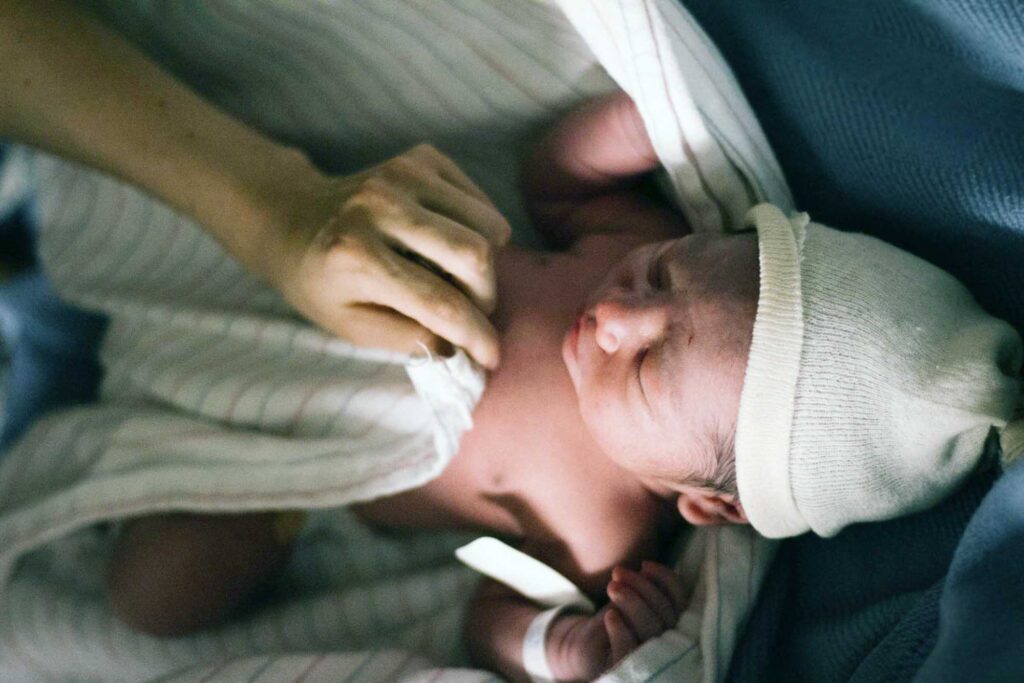
Sensitive Skin and Chemicals
Newborns have that sensitive baby soft skin (oh soooo adorable). Their delicate skin is adjusting to the outside world. This sensitivity makes them more vulnerable to irritants. Dryer sheets often contain chemicals and fragrances that can irritate baby’s skin. These chemicals even cause allergic reactions. Chemicals like quaternary ammonium compounds and fragrances, commonly found in dryer sheets. They leave a residue on clothes that doesn’t fully rinse out. This residue could cause skin issues for your baby.
Potential Allergic Reactions
Baby’s skin is born sensitive and some chemicals used in dryer sheets can trigger skin reactions. Sometimes, this reaction can lead to rashes or eczema. These potential allergic reactions are a big concern. As a parent it’s your responsibility not to expose the baby to allergens or unnecessary chemicals. Since babies’ immune systems are still developing you have to give extra care in items they wear daily.
Fragrance and Residue Concerns
While a fresh, clean scent may seem appealing, fragrances in dryer sheets are often made with synthetic ingredients that leave a residue on clothes. This residue may not only irritate sensitive skin but can also make baby clothes less breathable. And because babies tend to put everything in their mouths, you want to keep any potentially harmful substances far away from their reach.
Alternatives to Dryer Sheets for Newborn Clothes
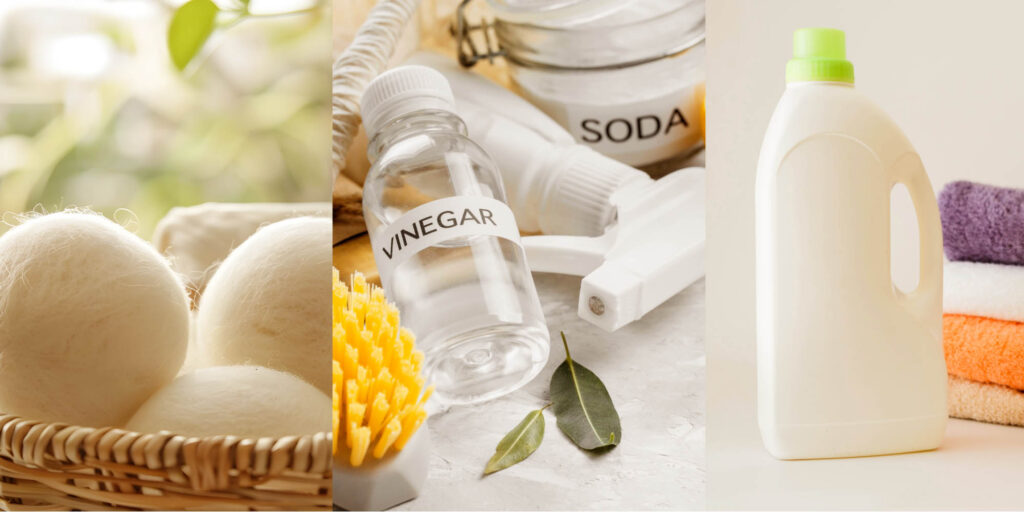
Thankfully, dryer sheets are not the last options to keep your baby’s clothes soft and static-free. There are plenty of safe alternatives and you can achieve similar results with them. You’ll not have any risk using them and will not risk your newborn’s sensitive skin.
Natural Fabric Softeners: White Vinegar and Baking Soda
Vinegar and baking soda has been used as a fabric softener for a long time. You can easily use these ingredients at home. They are great for baby’s clothes and work wonderfully. You can simply add half a cup of white vinegar to the rinse cycle. White vinegar removes detergent residue and static. It has no artificial fragrances or harmful chemicals. You can add baking during the wash cycle for additional softness and as a natural deodorizer. Baking soda keeps clothes fresh and clean without irritation.
Wool Dryer Balls
As an alternative to dryer sheets, wool dryer balls are fantastic. The best part of wool dryer balls is they are reusable. These balls soften fabric naturally and help reduce drying time, which saves energy. Wool dryer balls bounce around in the dryer, separating clothes and reducing static. Wool balls do all without any chemicals. You can even add a drop of baby-safe essential oil to the balls if you’d like a gentle, natural scent.
Fragrance-Free, Hypoallergenic Laundry Products
If you prefer using a fabric softener, look for hypoallergenic, fragrance-free options specifically formulated for babies. These products are made with the least harsh chemicals. They are appropriate for sensitive skin. If you choose baby-friendly products it will reduce the chance of skin irritation. It keeps clothes soft and comfortable.
How to Wash Newborn Clothes Properly
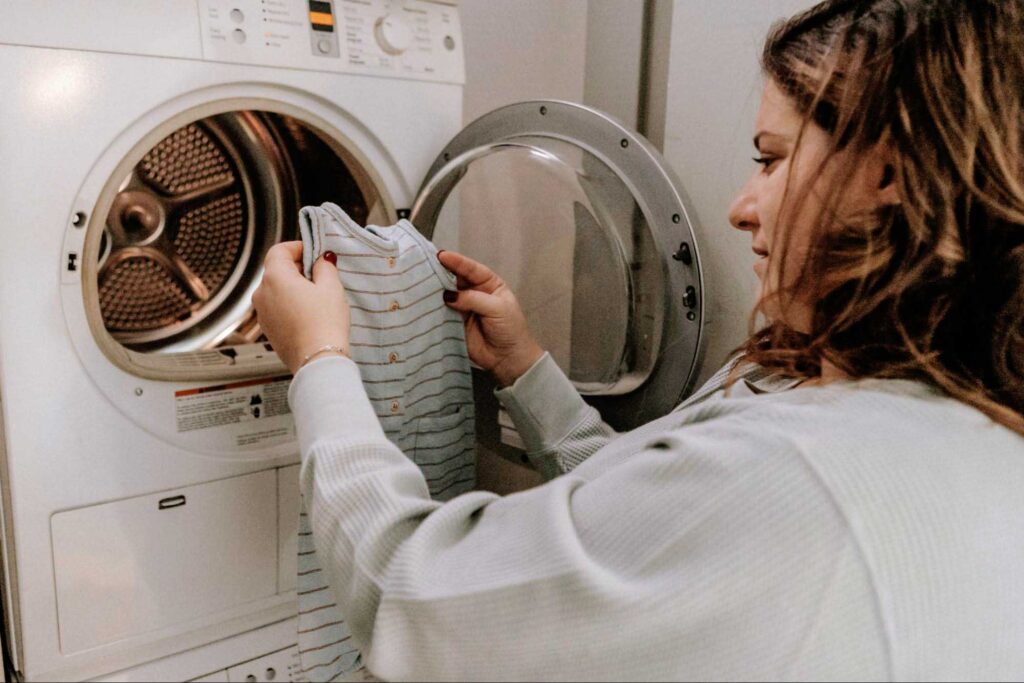
You have to wash the newborn’s clothes with extra care, love, and attention. Extra care will help you to prevent your baby’s skin irritation and will keep clothes clean and fresh.
Choosing the Right Detergent for Baby Clothes
- Should you choose a separate detergent for your little one? Well, yes. You can’t simply use the same detergent for your newborn that you use for cleaning your whole family’s clothes. You should have to choose a detergent that is free from fragrances and additives. Hypoallergenic detergents are less likely to cause skin irritation to babies.
- Since becoming a mom, I always take a moment before buying anything for my kids. When it comes to their food, clothing, or any products with chemicals that touch their skin, I’m especially careful. I always read the labels to avoid any harsh chemicals in their detergents. You should always check the detergent label for any harsh chemicals that could irritate the skin, like bleach or optical brighteners.
- You can choose an eco-friendly and plant-based option for your baby’s detergent. You can consider natural or eco-friendly detergents that are plant-based, which are generally gentler on the skin and the environment.
Preparing Newborn Clothes for Washing
- Before washing you have to sort your baby’s clothes first. Sort baby clothes by color to prevent bleeding and pre-treat any stains with baby-safe, mild soap to avoid stubborn marks.
- Remove tags, stickers, and any decorative items from baby’s clothes. Anything scratchy or rough could irritate a baby’s skin, so remove tags, stickers, or labels that might rub against their skin.
- For an extra step of caution, you can rinse clothes before washing to remove dust or residues from the manufacturing process.
Washing Newborn Clothes in 3 Steps
- Washing Method: Machine Wash vs. Hand Wash
Machine washing is usually fine, but for delicate items you should consider hand washing. You can machine wash on a gentle cycle and can still effectively clean most baby clothes.
- Using the Right Water Temperature
You can use warm water to help lift the stains for really dirty clothes. You should stick with cold water to keep fabrics in great shape for regular loads. This way, you get a good clean without damaging your baby’s clothes.
- Avoiding Fabric Softeners and Dryer Sheets
Try using natural options like vinegar or wool dryer balls to soften your clothes. They keep fabrics feeling cozy without any extra chemicals. It’s an easy way to keep things gentle on your baby’s clothes—and on them.
Drying and Storing Newborn Clothes
- Air Drying vs. Machine Drying
You should air dry your baby’s clothes. Air drying is the best and gentle way to keep baby clothes soft and cozy. It also helps preserve their delicate fabric longer. If you don’t have a lot of time and prefer using a dryer, try setting it to low heat to protect the clothes. You can also use wool dryer balls. They can also speed up drying time, which is helpful. Either way, you’ll keep those baby clothes fresh and ready for wear.
- Safe Machine Drying Tips
When you use a dryer, choose a low heat setting to help prevent shrinking. It keeps the shape and softness of your clothes intact. Low heat is a simple way to make clothes last longer.
- Storing Clean Baby Clothes
After they’re dry, put your baby’s clothes in breathable containers to keep them fresh. This helps them stay clean and free from dust. It’s an easy way to keep everything looking and smelling good.
Tips for Laundering Newborn Clothes Safely
- Use Gentle, Baby-Safe Detergents
Choosing the right detergent is the first and most important step in washing baby clothes. The right kind really makes a difference, so look for detergents made for sensitive skin or specifically for babies, as these are much gentler and help prevent irritation. Hypoallergenic and fragrance-free options are ideal because they keep things extra gentle. Fragrances and dyes can be harsh on delicate skin, so it’s best to steer clear of those. A mild, baby-friendly detergent will keep clothes feeling soft and cozy. With the right choice, you’ll have peace of mind knowing their skin is safe and protected.
- Proper Washing and Drying Techniques
Always wash all your baby’s clothes before their first wear. It will make sure they’re extra clean. This also helps get rid of any leftover chemicals or dust from the manufacturing process. You can dry the clothes in a low heat setting in the dryer. It’s best to air dry the clothes. Low heat can help prevent shrinking but if you can air dry clothes it’ll be even gentler on the fabric.
- Frequent Rinsing and Avoiding Fabric Softeners
You should rinse clothes thoroughly to ensure there is no leftover detergent. You can prevent skin irritation for your little one by rinsing clothes thoroughly. You should skip using fabric softeners altogether. Fabric softener can leave a coating on fabrics. This coating can irritate the sensitive skin of the baby. So, I suggest avoiding it. Instead, you can focus on giving those clothes an extra rinse to keep them fresh.
- Special Care for Delicate Items
You have to be careful while cleaning baby’s wool blankets, hats, and any special outfit. It’s best to be extra careful. If you can take some time and hand wash them then you can easily maintain their softness and quality. Delicate fibers like wool can get easily damaged in a washing machine. So, it’s better to take the time to hand wash them.
- Regular Maintenance of Washing Machine
You should regularly clean and maintain your washing machine if you wash your baby’s clothes in it. Over time, soap and residue can build up inside, which might transfer onto the clothes. You can prevent any build up by doing a quick rinse with vinegar once a month. You just have to run an empty cycle with vinegar. It will help break down any lingering buildup. It also ensures your baby’s clothes are safe and clean.
Frequently Asked Questions (FAQs)
Question: Is it okay to use fabric softener on newborn clothes?
Answer: Generally, it’s best to avoid using fabric softener on newborn clothes. Especially in the first few months you should avoid using any harsh chemicals on baby’s clothes. Newborn’s skin is sensitive and can react to these chemicals. You can use gentle detergent like hypoallergenic detergent. This will help keep their clothes soft and clean. This detergent will not irritate their delicate skin.
Question: What clothing material is best for newborns?
Answer: You should choose soft and breathable fabrics like cotton for newborns. Cotton feels gentle and on the skin. Babies will also feel comfortable wearing them. You can look for organic cotton options if possible. Organic cotton is less likely to contain harmful chemicals. You can also choose bamboo and modal. They are also soft and breathable for babies’ skins.
Question: Is 0 to 3 months clothes the same as newborn clothes?
Answer: Newborn clothes are not exactly the same as the 0 to 3 months old clothes. Brands design newborn clothes typically for babies whose weights are up to about 8 pounds. Babies who are usually up to about 12 pounds can fit 0 to 3 months of clothes. So, it’s good to check the sizing labels, as different brands have different sizing charts.
Question: What should newborns not wear?
Answer: You should not pick clothes made from rough materials for your newborns. Also avoid clothes with irritating tags and seams. You should not opt for clothes that are too tight or have small parts (like buttons) for babies that could pose a choking hazard. It’s best to dress them in loose-fitting and comfortable clothing.
Conclusion
Try to avoid dryer sheets on baby clothes as much as possible. They are full of chemicals and fragrances. These chemicals are pretty rough and not good for the soft skin of a baby. So rather use white vinegar, baking soda or wool dryer balls. You do not have to use the harmful chemicals and still keep your baby clothes soft & cozy, with these natural solutions.
I hope these simple newborn’s clothes washing tips will help you out the next time you wash your baby’s clothes.

